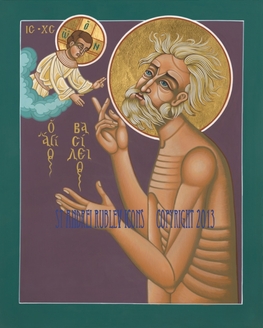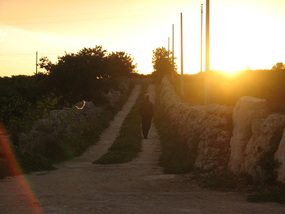 The main character in one of my favorite movies, The Island, is a monk named Anatoly who lives at an Orthodox monastery in Siberia. Apparently he is what is sometimes called a holy fool, a truly holy man who does things which seem bizarre, but which teach lessons.* In one scene the abbot, Fr. Filaret, decides to spend time with Anatoly to learn from him, and therefore he joins Anatoly in the boiler room where Anatoly chooses to sleep. That night Anatoly arises and begins to do all sorts of seemingly mad things: he claims the devil is present and that they are all going to ruin. He closes the flue and begins to stoke the fire, creating smoke that fills the room and so overpowers Fr. Filaret that he is gasping for air. Anatoly yells that he is smoking out the devil. During the chaos he takes Fr. Filaret's boots and throws them in the fire ‘to get rid of the devil.’ Then when they finally escape into the night air, he takes Filaret's prized sleeping mat and throws it into the bay. As they watch it float away, Filaret sits in stunned disbelief until Anatoly indicates to Filaret that he had become too attached to the prestige of having the boots and mat which were gifts from the bishop. He has taught his abbot about the perils of attachment and the freedom found in right usage of the gifts God has given us. While that scene may sound extreme, Anatoly was simply teaching the same message as in the gospels: it is not having 'stuff' that is the problem, but rather it is our attitudes to possessions that can become a stumbling block to us. Anatoly did not randomly choose this lesson. He saw what Filaret was lacking and he offered a very intense way of both pointing it out and removing the attachment. Anatoly explained what he did so that Filaret could see that it was not out of cruelty that he acted. Instead, he was freeing Filaret. It was clear that the lesson was learned and that Filaret was grateful, though still a bit stunned since he had not realized he was so attached. And this is the point: Fr. Filaret did not realize his attachment. We usually do not realize our attachments, either. If we did, we might not be so attached. It is only when the lesson comes to light, when we are tested, that we see (hopefully) that the root of our pain is an inordinate attachment. These can cause us trouble and so we, too, can all stand to learn this lesson from Anatoly. The truth of the matter is that we do place a lot of stock in things that we possess and in ways of doing things that we think are best. And sometimes we even become inordinately attached (in dependency or co-dependency) to people. A way to combat this is to realize all is gift and to develop an ‘attitude of gratitude.’ It is important to pray for the grace of gratitude and also for the grace to be able to see that which causes us to misplace our focus. Because we are human it will be a constant struggle, but it is important to learn.  We become attached without realizing it, which is why it is such a shock when it is revealed to us. Even for the least materialistic people, such as the fictional abbot who was living in the most minimal of conditions by choice, we do become attached to something or other. It is simply part of being human. But the wisdom comes when we realize that the attachments keep us from being free. This is not to say we need to become like Anatoly and throw everything in the fire or into the bay. Rather it means we need to recognize that all is gift so that we use and appreciate things the way they are meant to be, but do not define ourselves by them. We should not let our possessions possess us. Our lives should revolve around serving God through loving others, not the 'stuff' we possess or the attitudes to which we hold on. In the Gospel passage about Thomas, (who we unfairly call the Doubter), we see the effects of attachments. After the resurrection Jesus appeared to the apostles while Thomas was not there. (John 20) Thomas said he refused to believe that Jesus had resurrected until he put his hands in the wounds in Jesus’ hands and side. Thomas' problem was not a lack of faith; it was an attachment to his understanding of the way he thought things ought to be. Despite what Jesus had previously taught, he had always believed that when someone died it was final. There was no such thing as being alive again after someone had died. There was no way his friends could be correct in saying that Jesus had come to the upper room while he was away. Yet when Jesus did appear on an occasion when he was there Thomas exclaimed: "My Lord and my God!" That indicates not a lack of faith, but rather that his world had been rocked and he had let go of the attachment to his belief system which was keeping him from this new joy. The same is true of Peter when Jesus came to him on the seashore. (John 21) After Jesus died the apostles seemed confused as to how to proceed, so they reverted to the familiar, which was their old home in Galilee and the occupation of fishing they had before they took up with Jesus. In this passage Jesus had a conversation with Peter in which He asked Peter if he loved Him. There was a lot going on in that conversation, but the most significant is that Jesus was asking Peter if he could let go of his attachments to the way things had been and if he could serve in a new way. Three times Jesus said: "Peter do you love me?" In the original Greek it is clear that He was asking Peter if he can love like Jesus loves. That is: 'Can you give up your attachments to your way of loving? Can you go past loving like a friend loves and love more deeply, the way God loves? Can you give up everything, including your life, to serve me? Can you let go of your attachments to doing things your way and do as I would do?' When Peter finally ‘got it’ he was ready to lead the Church. He understood that much would be asked of him, and so he let go of the fishing in Galilee and eventually even the ministry in Jerusalem so that he could go to Rome and oversee the believers there, giving his life in the end.  Our attachments are often what lead us to disappointment. Unwittingly we expect something to be a certain way and when it goes another way we get angry and upset. We become disappointed and even can lose faith in someone or something because we are attached to seeing things our way, doing things as we want to do them, and projecting our hopes and desires onto others. The way to deal with this tendency is to learn to trust the Lord when things happen that we do not understand. We need to trust that He is there helping us to get through it, comforting us, and also helping us to adapt to a new reality. We need to recognize that things are for our use. We truly do not possess much at all: everything is gift. Yes, we work hard for what we have and there is nothing at all wrong with having things. But we also need to realize that the things that are most important are those which we do take to Heaven and so we should put our ‘stock’ there. What we will take into the hereafter is the wisdom, grace, and virtue we grew into in this life, the loving deeds done, the love we had for people, the acceptance of grace given, and the graciousness with which we lived. We will take the essence of who we are and the beauty of its imprint upon others. We will take our memories, will, and understanding, our faith in His mercy and love, wrapped in our own love and desire to be with God forever. We leave the material behind, knowing it is for someone else to use for a while. In the meantime, we need to realize that the best way to deal with the ‘twists and turns’ in life is to ask ourselves: “In the light of eternity, how important is this issue or thing?" If something seems to be taken from us unfairly, we need to ask for the grace to see that it was not ours to start with or that there is a reason for us to not have whatever it was any more. There may be a lesson in attachments somewhere inside the experience. When we are less attached, we are freer, and when we are freer, we are happier. May we have the courage to ask for our attachments to be revealed to us so that we can make right use of them and not be possessed by them! May we have the realization that everything is gift! May we have the grace of gratitude for the many gifts given us! And may we be open to new ways of doing things and sharing things with the freedom to be as we were meant to be as God’s sons and daughters! Let us continue to meet in the Heart of the Lord in freedom! Peace! ©Michele L. Catanese *The Holy Fool or yurodivy is the Russian version of foolishness for Christ, a peculiar form of Eastern Orthodox asceticism. The yurodivy is a Holy Fool, one who acts intentionally foolish in the eyes of men. The term implies behaviour "which is caused neither by mistake nor by feeble-mindedness, but is deliberate, irritating, even provocative." Ivanov, S. A. (2006) Holy Fools in Byzantium and Beyond. Oxford: Oxford University Press. The photos are mine. The top one was taken at Montauk Point, LI. The bottom photo was taken outside of Noto, Sicily while staying at a farm house. The icon is St. Vasily the Holy Fool by Fr. William Hart McNichols. It can be found at http://www.fatherbill.org/all-categories/product/314-st-vasily-the-holy-fool Comments are closed.
|
Heart Speaks to Heart
|

 RSS Feed
RSS Feed

